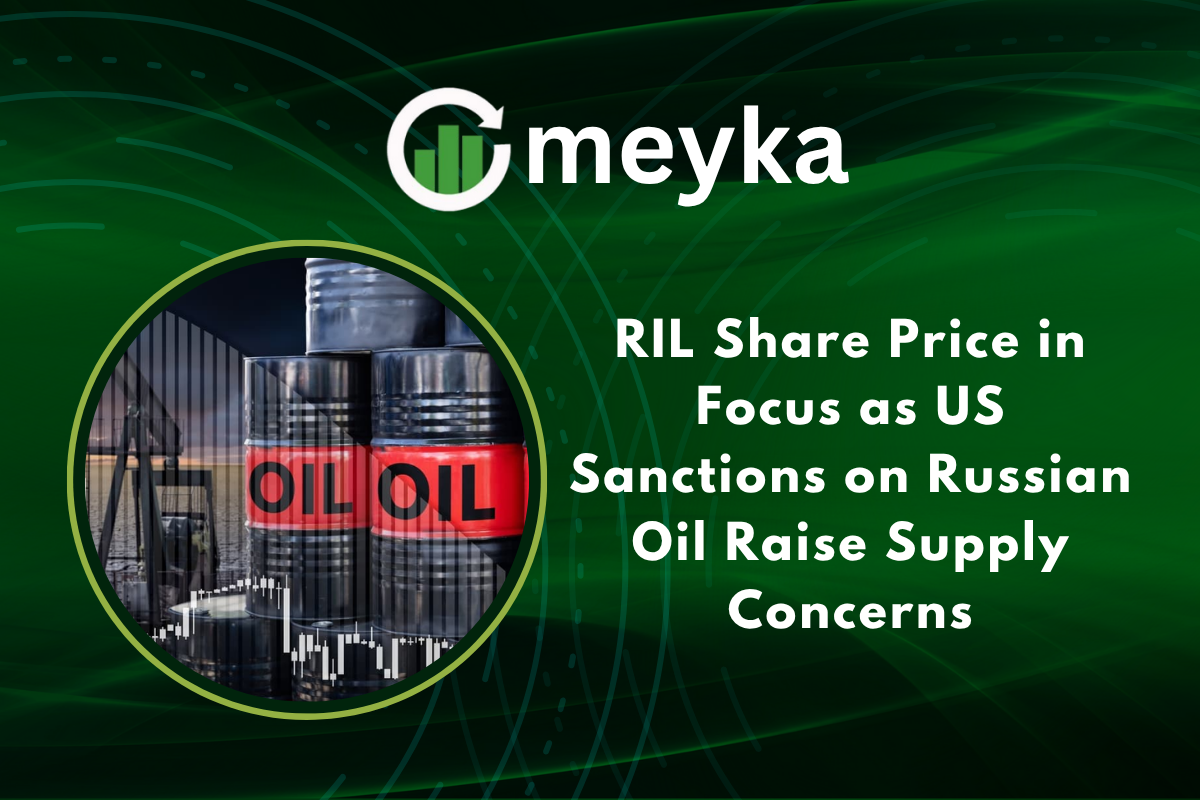RIL Share Price in Focus as US Sanctions on Russian Oil Raise Supply Concerns
Reliance Industries Ltd has found itself in the market spotlight after the United States moved to tighten sanctions on major Russian oil exporters. Investors reacted quickly, pushing RIL’s Share Price lower on fears that reliable, discounted Russian crude will become harder to source.
The move, announced as part of a White House push to squeeze Moscow’s energy revenues, was flagged by President Donald Trump in a policy statement that sent shockwaves through energy markets and trading desks.
Reliance, which runs the world’s largest single-site refinery at Jamnagar and has leaned on sharply discounted Russian barrels in recent years, now faces questions about crude supply, refining margins, and near-term earnings.
Why the RIL Share Price Is Under Pressure After US Sanctions
The markets moved quickly because the sanctions cut into a supply route that had boosted profits for Indian refiners. Traders saw an immediate risk to margins if Reliance and other refiners must replace cheap Russian crude with higher-priced alternatives.
RIL Share Price came under investor scrutiny because Reliance is one of India’s top importers of Russian oil and had structured long-term supply deals that factored into earnings forecasts.
News coverage showed the company and peers reassessing contracts and contingency plans as compliance and logistics questions rose. The White House announcement by President Donald Trump, and the sanctions targeting Russian energy majors were cited as the trigger for the volatility.
Why are traders reacting so strongly to these sanctions? The answer is simple. When a major buyer loses access to cheaper crude, the entire refining margin equation changes. Brent crude prices can jump.
Refiners see narrower spreads between crude input cost and fuel selling prices. That is exactly what worried investors on the day the sanctions hit the headlines.
How US Sanctions on Russian Oil Could Affect RIL and Indian Refineries
Industry reports and local outlets have sketched the pathways for pain. The Times of India and Business Standard described how Reliance and state-run refineries are looking to suspend or sharply reduce Russian purchases to avoid sanction risk, at least until compliance clarity returns.
Cutting Russian volumes could raise import costs and strain refining margins that improved when discounted Russian barrels flooded the Asian market.
For Reliance, which had signed term deals and also bought via intermediaries, the cost of replacing those barrels matters for EBITDA and cash flow.
India’s reliance on discounted Russian crude has helped private refiners post stronger refining profits since 2022. That advantage now faces erosion if supplies fall, either because Russian exports drop or because traders and insurers step back.
Analysts noted that while state refiners may try to keep flows via intermediaries for a time, the larger market signal is clear: pay more for crude or find alternate long-term suppliers.
Market Reactions and the Impact on RIL Share Price
Early trading showed RIL’s Share Price opening weaker, reflecting the swift shift in risk perceptions. NDTV Profit reported that Reliance shares settled lower on the session after the sanctions were announced, and that the stock had briefly underperformed the broader indices as traders digested the implications.
Market analysts described a likely short-term correction in the stock, while stressing that long-term fundamentals remain intact, given Reliance’s diversified earnings base.
Foreign institutional investors and domestic mutual funds reacted cautiously, with some trimming exposure and others viewing any dip as a buying opportunity.
Will the RIL Share Price recover soon? Sentiment will depend on two things. One is how quickly Reliance can secure alternative crude at competitive rates. The other is whether global crude benchmarks stabilise. If Brent retreats and supply routes adjust, margins could recover, and so could the stock. If prices spike and stay high, refining earnings for the quarter could be weaker than expected.
Understanding India’s Russian Oil Strategy and Global Trade Shifts
India dramatically increased Russian purchases after the Ukraine war began, often taking advantage of steep discounts. Reports from Bloomberg and other international outlets noted that Russian flows to India rose sharply, at times supplying a substantial share of the country’s crude needs.
Those same reports now warn that flows could fall to near zero if sanctions and compliance measures bite, shifting the balance of global trade and pushing India to seek more Middle Eastern barrels. That would change cost structures and shipping patterns for refiners.
Analysts expect Indian refiners to lean more on Middle Eastern term barrels and short-term cargo buys from other producers. Reliance’s Jamnagar complex has the technical flexibility to process different crude grades, but switching supply sources quickly comes with higher costs.
An energy analyst quoted in market coverage said Jamnagar may pivot to Middle East crude, but doing so will take time and could compress margins in the near term.
Donald Trump’s Energy Policy and Its Global Impact
President Trump framed the sanctions as a tool to punish Russian oil exports and to protect American energy interests. The new measures represent a shift in U.S. policy that has immediate ripple effects across Asia and Europe. Geopolitically, the sanctions change trade calculations.
India, historically pragmatic on energy sourcing, now faces pressure from multiple directions: commercial, diplomatic, and regulatory.
The global reaction on social platforms and newsfeeds underlined the breadth of concern, illustrating how a policy shift in Washington can reshape flows between India, Russia, and other suppliers.
What Analysts Say About the Future of the RIL Share Price
Most brokers and analysts acknowledge near-term headwinds for Reliance’s refining business. They also point to Reliance’s diversification as a buffer. Telecom earnings from Jio and retail revenue from Reliance Retail provide a durable cash flow that can help absorb refining volatility.
Several market voices, referenced in the Indian press, advised investors to view any steep sell-off as an opportunity for long-term holders while recommending caution for short-term traders. The consensus view is that fundamentals are not broken, but headline risk remains elevated until supply clarity returns.
Should investors hold or sell RIL shares now? That depends on the investment horizon. Long-term investors may prioritise Reliance’s scale and diversification. Short-term traders must watch crude trends and quarterly margin data closely.
How Global Oil Prices Could Influence the RIL Share Price in the Coming Weeks
Brent and WTI moves will be a direct read on refining margins. A sustained crude price uptick would likely compress margins and weigh on the RIL Share Price in the near term. On the other hand, if OPEC increases supply, or if U.S. shale output responds quickly, prices could stabilise and provide breathing room for refiners.
India’s import mix, shipping costs, and global trade tensions will all matter for Reliance’s earnings in the next reporting cycles.
Could RIL benefit from long-term oil price stability? Yes, but only if stability comes at moderate price levels that allow refiners to capture healthy spreads between refined products and crude input. Volatility and spikes are the real threats to refining earnings.
The Road Ahead for RIL Share Price Amid Global Oil Uncertainty
RIL Share Price has become a barometer for how policy-driven oil moves affect India’s energy sector. Donald Trump’s sanctions on Russian oil have reintroduced supply uncertainty. Reliance has operational strength and diversification to cushion shocks, but the near-term outlook will hinge on crude sourcing, compliance logistics, and how fast global markets adapt.
As global oil flows reshape, all eyes remain on Reliance’s next strategic moves and on how investors respond in the coming weeks.
FAQ’S
Yes, Reliance Industries has been importing discounted Russian crude since 2022 to boost refining margins, though recent U.S. sanctions may force it to reduce those purchases.
Reliance shares rose as investors bet on recovery in refining margins and strong performance from Jio and Retail, offsetting concerns over oil supply disruptions.
Yes, the U.S. has imposed strict sanctions on Russian oil exports to cut Moscow’s energy revenues and limit its global crude sales network.
In 2025, Russia’s main crude buyers are India, China, and some Middle Eastern refiners, though new sanctions are pushing many to scale back imports.
Disclaimer
The content shared by Meyka AI PTY LTD is solely for research and informational purposes. Meyka is not a financial advisory service, and the information provided should not be considered investment or trading advice.”






